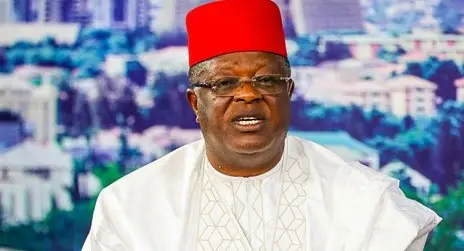Umahi reiterated that the Federal Ministry of Works remains committed to the planning, design, construction, and maintenance of federal road infrastructure across the nation under the Renewed Hope Agenda.
Abuja – The Federal Government of Nigeria requires over N16 trillion to complete ongoing road projects inherited from previous administrations, according to the Minister of Works, Mr. David Umahi.
Speaking to journalists in Abuja on Thursday, Umahi revealed that the current administration inherited 18,932.50 kilometers of ongoing road projects, encompassing 2,064 contracts.
As of May 2023, the total value of these projects was estimated at N14.42 trillion, with N4.73 trillion already certified. Of this, N3.12 trillion has been paid, leaving a debt of N1.61 trillion.
“The funding gap to complete all the inherited projects stands at approximately N13 trillion as of May 2023. This figure is expected to rise to more than N16 trillion when all projects are reviewed in line with current market realities,” Umahi stated. He attributed the increase to the removal of fuel subsidies and the floating of the naira.
The minister explained that many of these projects have been delayed for five to eight years, necessitating a review to align with current economic conditions. This review, however, excludes new projects under the Renewed Hope Agenda and four legacy projects.
Traditionally, highway projects in Nigeria have been funded through annual budgetary allocations. However, Umahi noted that these provisions have often been insufficient to meet the demands of highway development. To address this, the ministry has adopted alternative funding mechanisms, including the Presidential Infrastructure Development Fund (PIDF), Sovereign SUKUK, and the Road Tax Credit Scheme involving entities such as NNPCL, NLNG, Dangote, BUA, and others.
Umahi highlighted that since 2017, a total of N100 billion has been invested in road construction and rehabilitation through the SUKUK fund, with additional investments of N100 billion in 2018, N162.55 billion in 2020, N210.56 billion in 2021, and N110 billion in 2022. For 2023, the approved SUKUK provision stands at N250 billion.
The minister further disclosed that the Federal Executive Council (FEC) approved N2.59 trillion for 65 highway projects under the NNPCL Funding, covering 6,358 kilometers. However, due to inflation, the reviewed contract sum for these projects is now N5.288 trillion, leaving a funding gap of N2.702 trillion. To date, NNPCL has paid N840 billion, with N1.750 trillion still outstanding.
In an effort to attract sustainable investment in road infrastructure, the ministry introduced the Highway Development and Management Initiative (HDMI) under the Public-Private Partnership (PPP) Unit. This initiative aims to maximize the use of assets along the Right of Way (ROW) and ensure accountability and profitability in the management of federal highways.
As part of the Renewed Hope Agenda, four key highway projects have been selected for implementation to improve road connectivity across the six geopolitical zones and boost socio-economic development.
These projects include the Lagos-Calabar Coastal Road Corridor (750 km), Sokoto-Badagry Road (1,068 km), Calabar-Abuja Superhighway Project (482 km), and Akwanga-Jos-Bauchi-Gombe Road (439 km).
Umahi reiterated that the Federal Ministry of Works remains committed to the planning, design, construction, and maintenance of federal road infrastructure across the nation under the Renewed Hope Agenda.









Join our Channel...